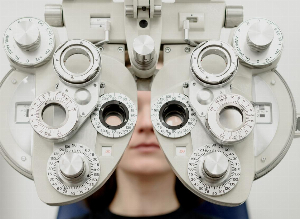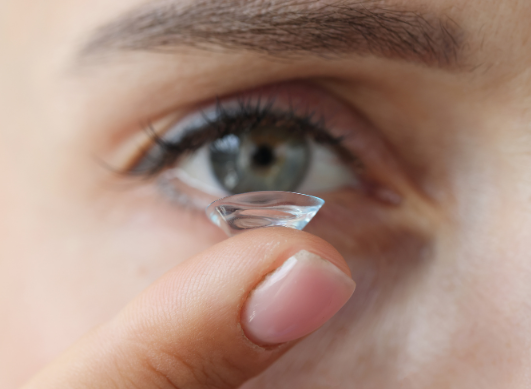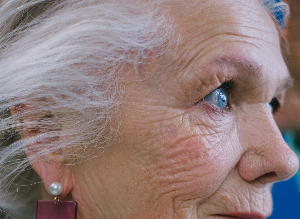Ophthalmologist, optometrist, optician: What is the difference and which is the best choice for your eyes?
Published 29 Jun 2021 • By Courtney Johnson
If you’ve ever sought out care for your eyes, you may have noticed that a number of different eye specialists exist. Making the right choice of a professional to consult is essential to your vision health.
What is an ophthalmologist, an optometrist, and an optician? How do their professions differ? Which specialist should you consult for your eyes?
We explain it all in our article!

In terms of eye care, there are three main types of eye professionals: ophthalmologists, optometrists, and opticians. Keep reading for a quick look at these three eye specialists:
What is an ophthalmologist? What kind of treatment do they provide?
An ophthalmologist is a medical doctor who specialises in ophthalmology, a branch of medicine and surgery focused on diagnosis and treatments of conditions affecting the eye.
Ophthalmologists have the highest level of education in medicine, which allows them to both diagnose and surgically treat eye diseases. They must complete a full medical program (five years of medical school leading to a degree in medicine (MBChB)) as well as two years as a newly qualified doctor doing basic medical training, they must register with the General Medical Council and finally seven years of ophthalmic specialist training (OST) where they engage in hands-on care for patients and study eye disease and surgical methods and must pass rigorous examinations set by the Royal College of Ophthalmologists. They may also pursue one to two years of additional specialized training or fellowship, which may focus on specific areas or diseases such as glaucoma, retinal or corneal diseases, paediatrics, neurology, or plastic surgery.
Ophthalmologists offer the following services:
- Vision services, including eye exams and prescription of eyeglasses or contact lenses
- Medical eye care (for conditions such as iritis, glaucoma, chemical burns, etc.)
- Surgical eye care (for trauma, cataracts, glaucoma, strabismus, etc.)
- Diagnosis and treatments for eye conditions linked to other illnesses, such as arthritis or diabetes
- Oculoplastics (plastic surgery to correct droopy eyelids or other conditions affecting the eye area)
Many ophthalmologists also contribute to scientific research on the causes, treatments, and cures of eye or vision disorders.
What is an optometrist? What kind of treatment do they provide?
An optometrist, on the other hand, is not a medical doctor but a doctor of optometry (OD). Optometrists act as primary health care providers for routine eye care, providing comprehensive medical and optical eye services, with the exception of surgery. Since 2009, optometrists in the UK, are able to undertake additional postgraduate training to all them to be able to prescribe medications for treating and managing eye conditions.
Doctors of Optometry typically complete a three or four year undergraduate honours degree in optometry (BOptom (Hons)) followed by one year of pre-registration experience (internship), during which they complete clinical practice under the supervision of a qualified and experienced practitioner. After one year of clinical practice, they must complete the Professional Qualifying Examination set by the College of Optometrists and register with the General Optical Council.
Optometry study is highly specific to the eyes and related structures and includes intensive study of basic and advanced eye examination techniques, client case history and studies, as well as additional courses in the natural sciences and pharmacology.
Optometrists offer the following services:
- Routine or annual eye exams and vision tests
- Prescription and fitting of eyeglasses, contact lenses and other visual aids
- Management and treatment of chronic eye conditions like glaucoma or dry eye
- Monitoring and follow-up of eye conditions related to other illnesses (diabetes, etc.)
- Providing low-vision aids and vision therapy (orthoptics, etc.)
What is an optician? What kind of treatment do they provide?
An optician, technically called a "dispensing optician", is a customer service representative in a vision care centre or optometrist’s office. Opticians are not eye doctors and so cannot give eye exams or prescribe medications.
Opticians are not required to have a specific degree and become certified by completing a 3-year training course in ophthalmic dispensing. They must pass all parts of the Professional Qualifying Examinations set by the General Optical Council and register with the GOC in order to practice.
Opticians perform the following services:
- Reception and filling of eye prescriptions from ophthalmologists and optometrists
- Measuring, fitting, and adjusting eyeglass frames
- Assisting customers in choosing eyeglasses, contacts, and other vision aids and accessories
- General office duties involved in running a vision centre or optometry office
Opticians can also answer general questions about eye care, but cannot examine, diagnose, or treat eye conditions.
Which professional should you consult for your eye needs?
Ophthalmologists, optometrists and opticians are all eye care professionals with different areas of specialization and expertise. Choosing the right eye care professional will depend on your needs.
If you are having trouble with your vision and think you may need eyeglasses or contact lenses, seeing an optometrist may be a good place to start. The optometrist can perform a comprehensive eye exam and if there is anything of concern, refer you to an ophthalmologist.
If you have an eye condition, have another health condition that also affects the eyes, or need eye surgery, it is advisable to see an ophthalmologist. It is also a good idea to consult an ophthalmologist if you have not had a comprehensive, dilated eye exam by 40 years of age, even if you haven’t noticed any issues with your eyes or vision.
If you’re prescribed or are renewing eyeglasses, contacts, or another vision aid, an optician will be there to help you choose the best option for you.
Was this article helpful to you?
Share your thoughts and questions with the community in the comments below!
Take care!
Sources:
- Difference between an Ophthalmologist, Optometrist and Optician, American Association for Pediatric Ophthalmology and Stabismus
- Optometrist vs. Ophthalmologist: What’s the difference?, Healthline
- Eye Doctors: Optometrists and Ophthalmologists, WebMD
- What is an Ophthalmologist?, The Royal College of Ophthalmologists
- What is an optometrist?, The College of Optometrists
- What Is the Difference Between an Optometrist and an Ophthalmologist?, VeryWellHealth
Comments
You will also like

Shakeila: “Embracing my life and the beauty of the world despite my eyesight" (Keratoconus)
27 Sep 2023

Multi condition: “At present I am well, and I am trying to make the most of my life!”
12 Jul 2023 • 1 comment

 Facebook
Facebook Twitter
Twitter
